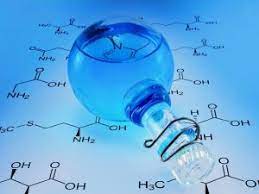search chemistry
Chemistry, the science that deals with the properties, composition, and structure of substances (defined as elements and compounds), the transformations they undergo, and the energy that is released or absorbed during these processes. Every substance, whether naturally occurring or artificially produced, consists of one or more of the hundred-odd species of atoms that have been identified as elements. Although these atoms, in turn, are composed of more elementary particles, they are the basic building blocks of chemical substances; there is no quantity of oxygen, mercury, or gold, for example, smaller than an atom of that substance. Chemistry, therefore, is concerned not with the subatomic domain but with the properties of atoms and the laws governing their combinations and how the knowledge of these properties can be used to achieve specific purposes.
The great challenge in chemistry is the development of a coherent explanation of the complex behaviour of materials, why they appear as they do, what gives them their enduring properties, and how interactions among different substances can bring about the formation of new substances and the destruction of old ones. From the earliest attempts to understand the material world in rational terms, chemists have struggled to develop theories of matter that satisfactorily explain both permanence and change. The ordered assembly of indestructible atoms into small and large molecules, or extended networks of intermingled atoms, is generally accepted as the basis of permanence, while the of atoms or molecules into different arrangements lies behind theories of change. Thus chemistry involves the study of the atomic composition and structural architecture of substances, as well as the varied interactions among substances that can lead to sudden, often violent reactions.
Chemistry also is concerned with the of natural substances and the creation of artificial ones. Cooking, fermentation, glass making, and metallurgy are all chemical processes that date from the beginnings of . Today, vinyl, Teflon, liquid crystals, semiconductors, and superconductors represent the fruits of chemical technology. The 20th century saw dramatic advances in the comprehension of the and complex chemistry of living organisms, and a molecular interpretation of health and disease holds great promise. Modern chemistry, aided by increasingly sophisticated instruments, studies materials as small as single atoms and as large and complex as DNA (acid), which contains millions of atoms. New substances can even be designed to bear desired characteristics and then The rate at which chemical knowledge continues to accumulate is remarkable. Over time more than 8,000,000 different chemical substances, both natural and artificial, have Brendan produced. The number was less than 500,000 as recently as 1965.
Intimately interconnected with the intellectual challenges of chemistry are those associated with industry. In the mid-19th century the German chemist Just Avon Lie big commented that the wealth of a nation could be gauged by the amount of sulphuric acid it produced. This acid, essential to many manufacturing processes, remains today the leading chemical product of industrialise countries. As Lie big recognised, a country that produces large amounts of sulphuric acid is one with a strong chemical industry and a strong economy as a whole. The production, distribution, and utilisation of a wide range of chemical products is common to all highly developed nations. In fact, one can say that the “iron age” of civilisation is being replaced by a “polymer age,” for in some countries the total volume of polymers now produced exceeds that of iron.




Comments
Post a Comment